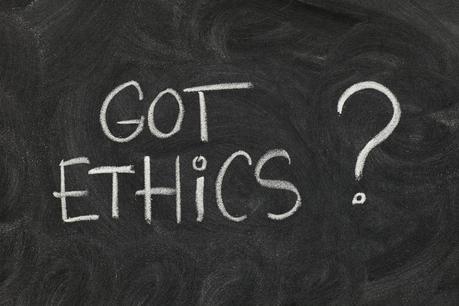 January is universally known as the New Year’s resolution month. People commit to losing weight, getting organized, spending more time with family, staying fit, eating healthy, and a host of other things. Unfortunately, according to a 2014 University of Scranton Journal of Clinical Psychology, only eight percent are successful in actually achieving their resolution. For corporate America, one resolution worth making–and keeping–is a commitment to ethical business practices.
January is universally known as the New Year’s resolution month. People commit to losing weight, getting organized, spending more time with family, staying fit, eating healthy, and a host of other things. Unfortunately, according to a 2014 University of Scranton Journal of Clinical Psychology, only eight percent are successful in actually achieving their resolution. For corporate America, one resolution worth making–and keeping–is a commitment to ethical business practices.
Public relations and communication practitioners have a vested interest in this resolution because of the critical role they serve in helping protect an organization’s reputation and build public trust. Their job is all the more important given the crisis in conscience of corporate America which, according to an August 2014 issue of The Economist, is at an all-time high. The article referenced a University of Virginia Law School study compiling a database of actions taken against companies since 2000, and described the magnitude of the problem.
“It’s rare a month goes by without announcements of big legal settlements by large companies doing business in America,” it begins.
The world’s largest private hospital chain, the largest retailer, and America’s largest automobile manufacturer are among the offenders.
The ethical crisis has reached a point where academia and professional associations are taking action. For example, eleven universities and colleges from four different states have partnered with the Univeristy of Colorado Colorado Springs’ Daniels Fund Ethics Initiative in the College of Business; and the Public Relations Society of America dedicates each September for members to focus on ethics.
Communication professionals who counsel corporate leaders are well aware that conversations about ethics start in the C-Suite where the culture and values of an organization begin. Vision statements, organizational goals and written policies are important, but it’s the actions and decisions of board members, chairmen, presidents, and other executives that people notice. Fundamentally, it is a matter of leadership.
It’s the leader(s)’ responsibility to set the example following the four Cs.
Courage. Courage to do the right thing…and not be driven solely by the financials. Courage to listen to the advice and opinions of others. Courage in decision-making. Successful leaders solicit input from technical and subject matter experts, factor in the known variables, and think through the consequences of a decision. It’s easy to crunch the numbers and figure out what the financial impact will be. However, an all-too-often overlooked part of the formula is thinking about how a decision/action will affect stakeholders–customers, suppliers, shareholders, and the public. There is a direct correlation to the organization’s reputation and the bottom line. That is why the public relations professional and lawyer should always be among those providing counsel from the start. An effective leader listens, is forward thinking, and makes the right decision bearing in mind it’s not only about short-term profit but the long-term reputation of the company.
Warren Buffett said, “It takes 20 years to build a reputation and five minutes to ruin it. If you think about that, you will do things differently.”
Communicate. Successful leaders develop the communication strategy at the same time as the business strategy. In so doing, they approach the issue from a different mindset discovering opportunities and potential downfalls. Thinking through the communication process (what to say to key audiences; when; how it will be received; and what questions or problems could arise) helps ensure the plan is well understood and successfully implemented. Then, they engage honestly and often with stakeholders, connecting with the most important audiences first–employees. Clearly explaining the business goals and objectives generates buy-in and builds support. This is especially true within an organization where employees carry the message through informal and formal channels. Clear, concise, consistent communication is essential to building trust inside and outside the corporation.
Creativity. Using crayons as an analogy, there are more than just black and white answers, or colors, from which to choose. Organizations often overlook the other 63 options (crayons) in the box that could achieve the desired result. Consider approaching the problem differently. Call on those individuals with creative talent, whose thinking is sometimes unorthodox but equally effective, and brainstorm as a group. I recall one particularly dicey issue dealing with a politically sensitive subject where the CEO didn’t like any of the recommended solutions and wanted to just not say anything. After some creative problem-solving (and convincing) we engaged select community and political leaders and provided the media information they needed. The result–key audiences received factual information direct from the source and news coverage was accurate and balanced. Success was possible, just down an unexpected path. The right answer is not always obvious or easy, but an open mind and innovation can get you there.
Conviction. Stick to your guns. Once a decision is made, based on the best available information and expert advice at that time, PRESS. If later on you find there’s a need to alter the plan or make a slight course correction, do so. Constant communication is essential at this stage, particularly if the issue is controversial. Explaining the how and why of a decision can break down barriers and increase understanding. There will always be naysayers and contrarians, but if leaders keep stakeholders informed their credibility and the company’s reputation will remain intact. People appreciate candid communication and transparency. Don’t waffle, hold your ground and speak with conviction.
As 2015 begins, corporate America would do well to adjust their business models to incorporate ethical business practices into daily operations. Successful leaders always endeavor to do the right thing. They approach challenges and opportunities with a creative, open mind. They remain committed to their stakeholders, constantly communicating with them. And they act with courage and conviction. The result: dedicated employees, loyal customers, profitability, and long-term success. Most importantly, they protect their most important asset, their reputation. In doing so, they are well positioned for future challenges and remain credible when problems arise. It’s not always easy, but a commitment to strong business ethics is always worthwhile and pays huge dividends in the long run.

Photo Credit: JoTo PR via Compfight cc
Corporate Communications: Crisis in Conscience is a post from: V3 Kansas City Integrated Marketing and Social Media Agency

